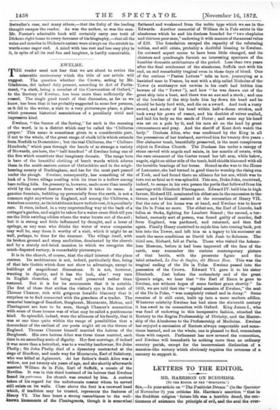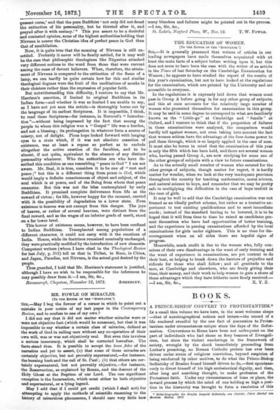LETTERS TO THE EDITOR.
MR. HARRISON ON BUDDHISM.
[TO TRH EDITOR OF TRH " SPROTAT011.1
SIR,—In your article on "The Positivist Dream" (in the Spectator- of November 9) you criticise Mr. Harrison's assertion "that La the Buddhist religion future life was a horrible dread, the con- tinuance of existence the principle of evil, and the soul the ever-
present curse,' and that the pure Buddhist not only did not dread the extinction of his personality, but he thirsted after it, and prayed after it with ecstacy.' " This you assert to be a doubtful and contested opinion, some of the highest authorities holding that Nirvana is nearer the Christian idea of perfect peace in God than that of annihilation.
Now, it is quite true that the meaning of Nirvana is still un- settled. Probably it never will be finally settled, for it may well be the case that philosophic theologians like Nagasena attached very different notions to the word from those that were current among the mass of devout believers. When, therefore, the attain- ment of Nirvana is compared to the extinction of the flame of a lamp, we can hardly be quite certain how far this and similar theological dogmas were the fruit of the meditations of monks in their cloisters rather than the expression of popular faith.
But notwithstanding this difficulty, I venture to say that Mr. Harrison's assertion, if limited to original Buddhism in its Indian form—and whether it was so limited I am unable to say, as I have not yet seen the article—is thoroughly borne out by the language of its earliest Scriptures. It is impossible, I think, to read those Scriptures—for instance, in Burnouf's " Introduc- tion "—without being impressed by the fact that among the people to whom this religion was a "Gospel" life was a burden, and not a blessing ; its prolongation in whatever form a source of misery, not of delight. Pious hope looked forward with longing eyes to a state which, if it was not absolute cessation of existence, was at least a repose so perfect as to exclude altogether the active exertion of the faculties, and to be almost, if not quite, equivalent to the absence of any distinct personality whatever. Who the authorities are who have de- scribed this condition as one resembling "peace in God" I am not aware. Mr. Beal, it is true, considers it to be one of "rest and peace ;" but this is a different thing from peace in God, which would imply a definite consciousness of object and subject, of the soul which is at peace, and of the Being from whom that peace emanates. But this was not the bliss contemplated by early Buddhism. It promised complete deliverance from life as the reward of virtue ; for life, however happy for the moment, carried with it the possibility of degradation to a lower state. Even existence is heaven was not exempt from this danger. The joys of heaven, or rather of several heavens, were distinct from the final reward, and as the wages of an inferior grade of merit, stood on a far lower level.
This horror of existence seems, however, to have been confined to Indian Buddhism. Transplanted among populations of a different character, it could not carry with it the emotions of India. Hence, while its doctrines remained nominally unchanged, they were practically modified by the introduction of new elements. Competent writers (whom I have cited in the Theological Review for last July, p. 313) tell us that in Thibet, in Siam, in China, and Japan, Paradise, not Nirvana, is the actual goal desired by the people.
Thus guarded, I hold that Mr. Harrison's statement is justified, although I have no wish to be responsible for the inferences he may possibly draw from it.—I am, Sir, &c.,
Ravenscroft, Chepstow, November 12, 1872. AMBEELEY.



































 Previous page
Previous page